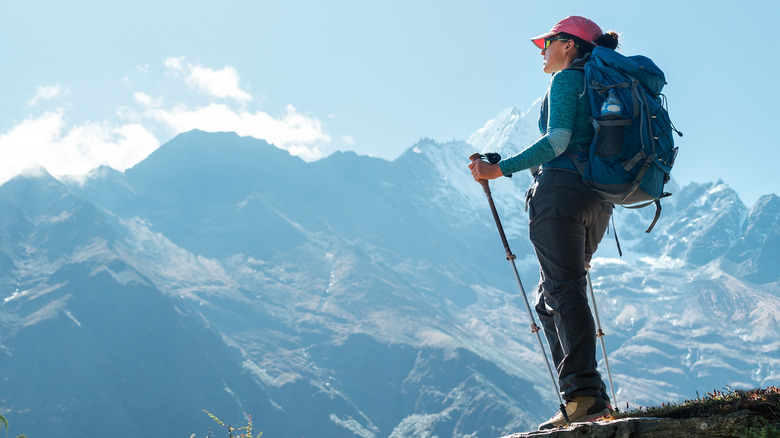This Is What You Can Do To Prevent Altitude Sickness
Altitude sickness, also known as acute mountain sickness, is a reaction to high altitudes where the air pressure is lower (aka thinner) and contains less oxygen, according to the University of Michigan. While it's common among mountain climbers and other outdoor enthusiasts who like to trek up tall peaks, it also strikes travelers who fly into high elevation cities like Cuzco, Peru, Bolivia, and Tibet. If hiking or skiing is on the agenda before our body has time to adjust to the altitude change, we may be at greater risk of experiencing adverse effects.
Altitude sickness usually occurs at heights over 8,000 feet, and the adjustment process happens naturally within two or three days. In the meantime, you may suffer from symptoms such as headaches, dizziness, nausea, vomiting, fatigue, and insomnia (via WebMD). More severe cases can even cause fluid to buildup in the lungs and brain — two instances that have potentially life-threatening risks requiring immediate medical attention.
Fortunately, there are several things you can do to prevent altitude sickness.
Setting yourself up for healthy travel
Perhaps the most important thing you can do to prevent altitude sickness is to ascend higher altitudes slowly. Give your body a day or two to adapt before setting out to the highest ski slopes or trekking the tallest mountains. Also, it can help to break up your trip into several destinations. For example, if you are going to the Rocky Mountains, consider spending your first night in Denver, which is lower in elevation (via the University of Michigan). This can give your body more time to adjust.
Additionally, you may also want to cut down on caffeine and alcohol the day before you travel. "Most people are traveling for fun, but alcohol and caffeinated drinks are things that actually affect our ability to adjust to the altitude," Dr. Choi, a pulmonologist, tells Cleveland Clinic. Other helpful tips include drinking twice as much water as you normally would and prioritizing carbohydrates. Carbohydrates require less oxygen to burn than other macronutrients.


